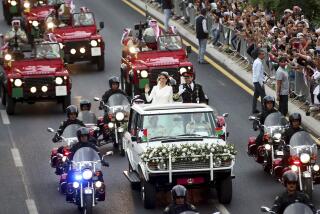High Iraqi Official Visits King Hussein : Diplomacy: Foreign minister bears a personal message from Saddam Hussein. But its content is shrouded in silence.
- Share via
AMMAN, Jordan — Iraqi Foreign Minister Tarik Aziz made a flying visit Saturday to Jordan, a determined peacemaker in the Persian Gulf crisis, but his mission was shrouded in silence.
A ranking Jordanian official said only that Aziz had delivered a personal message to King Hussein on “recent developments in the gulf crisis.”
The note from President Saddam Hussein was discussed over lunch, 24 hours before the Iraqi leader was to speak at Baghdad ceremonies today marking the Prophet Mohammed’s birth date, a day earlier than the rest of the Muslim world’s ceremonies.
Amman diplomats said Saddam Hussein’s message could have dealt with any of a range of issues, including possible feelers on a political solution to the crisis. But there was little in the week that preceded its delivery that suggested Baghdad was looking for a way out of the confrontation with Western forces over the Aug. 2 invasion of Kuwait.
A week ago today, Hussein threatened to attack Persian Gulf oil fields and even Israel if the U.N.-mandated trade embargo began to strangle Iraq’s economy. The threat may have been largely rhetorical, but it was enough to send oil prices soaring over $40 a barrel in Western markets.
In the same speech, the dogged Iraqi strongman again declared the annexation of Kuwait irreversible. The U.N. Security Council’s answer two days later was adoption of an air embargo to further tighten the blockade.
The half-day visit by Aziz, who flew into Amman in a small Iraqi government jet, marked his first visit here since late August, when he met with U.N. Secretary General Javier Perez de Cuellar. The U.N. leader, searching for the parameters of a political solution to the gulf crisis, left disappointed. “I have failed,” he told reporters later.
Nevertheless, King Hussein has continued his efforts as a peace seeker, most recently meeting in Morocco with King Hassan II and Algerian President Chadli Bendjedid on Sept. 17-20. The three moderate Arab leaders called on Iraq to make a commitment to withdraw from Kuwait in the framework of a wider settlement. There has been no public answer from Baghdad, and no anticipation that one was delivered by Aziz on his visit here.
Meanwhile, King Hussein, the fence-walking monarch of a decidedly pro-Iraqi populace, postponed Monday’s scheduled opening of Parliament for 48 days, the official Petra news agency reported. No reason was given, but the political floor of Parliament would give Baghdad enthusiasts a high profile.
In other crisis developments:
* French Foreign Minister Roland Dumas warned that the Paris government would retaliate if an investigation proves that Iraqi agents are responsible for a cafe attack that killed a young boy and wounded 17 other people in the former French colony of Djibouti in East Africa.
In the Thursday night attack, still unidentified assailants tossed grenades into a cafe crowded with off-duty French servicemen. Djibouti is the major staging base for French forces being deployed in Saudi Arabia as part of the Western military force there. The first units of the French Foreign Legion went ashore Saturday, and the total French commitment is expected to reach 13,000, the nation’s largest overseas deployment since the Algerian war of independence in the 1950s and early 1960s.
If Iraq is found responsible for the Djibouti incident, directly or indirectly, Dumas told a television interviewer in Paris, “There will be a response from France and--you better believe it--it will be appropriate to the hateful nature of this attack.”
In the explosive gulf, military analysts fear that even an isolated incident like the Djibouti attack could trigger a series of escalations that could start a full-scale war.
* In Cairo, Egyptian military sources told Associated Press that another 1,000 troops left the port of Alexandria for Saudi shores, and the total Egyptian force by the end of the coming week will be 14,000. Egypt has deployed the largest non-gulf Arab force in the confrontation. Along with Saudi, Syrian and Moroccan troops, and non-Arab Islamic forces from Pakistan and Bangladesh, the Egyptians form the front line in the Saudi desert facing 430,000 Iraqi troops in Kuwait and the territory north and west of the Iraqi border. The anti-Iraqi Muslim troops are backed by even stronger Western ground forces, primarily Americans.
* The Iraqi government denied reports that it would deny rationed food to foreigners beginning Monday. “There are no instructions to deprive foreigners from benefiting from the ration cards as claimed by certain hostile media,” Iraqi Trade Minister Mohammed Mehdi Saleh said in Baghdad. Press accounts of the reported restrictions sent a surge of Asian and Egyptian workers seeking sanctuary across the Jordanian border.
More to Read
Sign up for Essential California
The most important California stories and recommendations in your inbox every morning.
You may occasionally receive promotional content from the Los Angeles Times.













